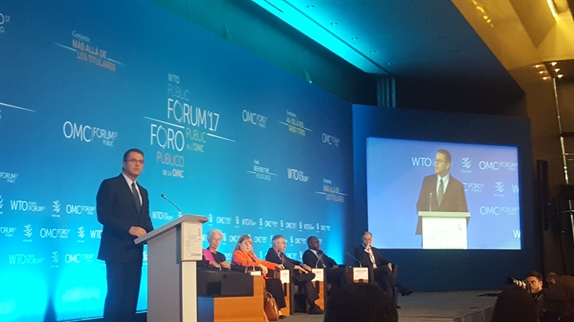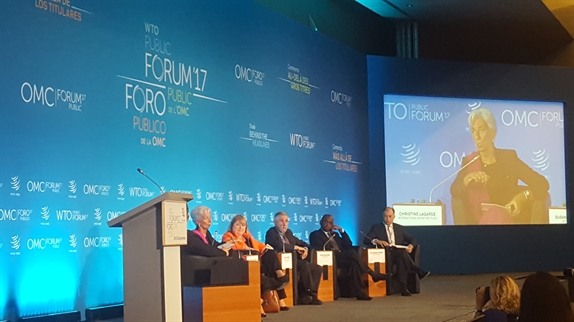
Report by Arne Mielken MIEx (Grad), Young President of the IOE&IT
The Institute of Export & International Trade (IOE&IT), the UK’s only professional body representing international traders, is proud to participate & host a key session in the Public Forum this year. The Forum is the World Trade Organisation's (WTO) largest annual outreach event, which provides a platform for participants to discuss the latest developments in world trade and to propose ways of enhancing the multilateral trading system. In this blog entry, we reflect on some of the interesting views we heard.
Over the next three days, the WTO will host over 100 dynamic trade sessions, organised by representatives from civil society, academia, business, the media, governments, parliamentarians and inter-governmental organizations. This year there are 2250 participants from over 100 countries.
At a time when the debate on trade has rarely been as prominent or controversial, the WTO's 2017 Public Forum, "Trade: Behind the Headlines", offers the IOE&IT an opportunity to go beyond the rhetoric and to assess the role that we can play in shaping global trade trends. This will allow us to support our members’ understanding of what future changes in global supply chain are likely to look like, especially where we are heading for a future outside the European Union where the buzzwords of the day are “Global Britain” and “Open for business”. “Globalisation is change on steroids” Bruce Stokes, Director, Global Economic Attitudes, Pew Research Center stated at the opening session of the event - and IOE&IT members need to be ready!
The WTO Director-General Roberto Azevêdo said: “There is no doubt that this is a testing time for global trade. In a time of rapid economic change, driven by technology, we have the challenge of ensuring that trade continues to be a positive force for job creation, growth and development around the world”. Mr. Strive Masiyiwa, founder of the international telecommunications, media and technology group Econet Wireless, believes that globalization is being driven by fast-paced technological change and the fragmentation of production and that its impact has become more sudden, more selective, more unpredictable, and more uncontrollable. Although technology has been a major driver of global trade change over the last years and has been hugely beneficial to Africa, more must be done to contribute to growth!

“Many companies who have taken advantage of moving from a closed market to an open market have been able to double revenue and employment. To make trade more inclusive, support for SMEs must be a focus of national trade policy by helping them understand the complexities of international trade and different (“messy”) trade rules. The WTO Trade Facilitation Agreement can play a major role in this. Small firms do not need protection but enablement, support and easier ways of doing business” Dr. Naushad Forbes, Director of Forbes Marshall, India's leading steam engineering and control instrumentation firm stated.
In the afternoon, the IOE&IT host an important session called “Learning International Trade: How formal qualifications help us reap the benefits of global trade”. The session explores how professional trade qualifications are a key to providing best practice methodologies to both employers and employees involved in international trade and how these are essential to career planning and development. The IOE&IT offers many training trade courses, formal certification courses and online training, so during this session we stress the benefits of such qualifications from the perspectives of businesses, employees and the national economy as a whole, focusing on to the potential for business growth, trade compliance, enhanced career prospects and boosting trade opportunities.
Moderator Arne Mielken (Young President, The Institute of Export and International Trade) is delighted to welcome a distinguished panel including Rose Blatch, CEO, International Trade Institute of Southern Africa (ITRISA), Hans-Michael Wolffgang, Head of the Department of Customs and Excise, Institute of Tax Law, University of Münster, Germany and Jan Hoffmann, Chief, Trade Logistics Branch, United Nations Conference on Trade and Development (UNCTAD), stating: “Lifelong trade learning is the foundation for a successful global business. Knowledge is power. Knowledge means careers. Join us to discuss of how spread the knowledge of trade”. Lesley Batchelor, Director General, The Institute of Export and International Trade, also took the floor to introduce the Institute and the major effort it undertakes to promote lifelong trade learning. She stated: “What a wonderful opportunity to find out about the future of global trade and engage with the International trade community! A must-go event in any trader’s calendar”.
If you are attending, join us at 26 SEPTEMBER 2017,15:30-17:00, ROOM F.
We look forward to a fascinating second day.



